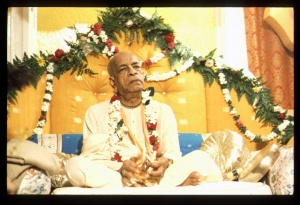SB 5.17.12

A.C. Bhaktivedanta Swami Prabhupada
TEXT 12
- eṣu puruṣāṇām ayuta-puruṣāyur-varṣāṇāṁ deva-kalpānāṁ
- nāgāyuta-prāṇānāṁ vajra-saṁhanana-bala-vayo-moda-pramudita-mahā-saurata
- -mithuna-vyavāyāpavarga-varṣa-dhṛtaika-garbha-kalatrāṇāṁ
- tatra tu tretā-yuga-samaḥ kālo vartate
SYNONYMS
eṣu — in these (eight) varṣas, or tracts of land; puruṣāṇām — of all the men; ayuta — ten thousand; puruṣa — by the measure of men; āyuḥ-varṣāṇām — of those whose years of life; deva-kalpānām — who are like the demigods; nāga-ayuta-prāṇānām — having the strength of ten thousand elephants; vajra-saṁhanana — by bodies as solid as thunderbolts; bala — by bodily strength; vayaḥ — by youth; moda — by abundant sense enjoyment; pramudita — being excited; mahā-saurata — a great deal of sexual; mithuna — combinations of man and woman; vyavāya-apavarga — at the end of their period of sexual enjoyment; varṣa — in the last year; dhṛta-eka-garbha — who conceive one child; kalatrāṇām — of those who have wives; tatra — there; tu — but; tretā-yuga-samaḥ — exactly like the Tretā-yuga (when there is no tribulation); kālaḥ — time; vartate — exists.
TRANSLATION
In these eight varṣas, or tracts of land, human beings live ten thousand years according to earthly calculations. All the inhabitants are almost like demigods. They have the bodily strength of ten thousand elephants. Indeed, their bodies are as sturdy as thunderbolts. The youthful duration of their lives is very pleasing, and both men and women enjoy sexual union with great pleasure for a long time. After years of sensual pleasure—when a balance of one year of life remains—the wife conceives a child. Thus the standard of pleasure for the residents of these heavenly regions is exactly like that of the human beings who lived during Tretā-yuga.
PURPORT
There are four yugas: Satya-yuga, Tretā-yuga, Dvāpara-yuga and Kali-yuga. During the first yuga, Satya-yuga, people were very pious. Everyone practiced the mystic yoga system for spiritual understanding and realization of God. Because everyone was always absorbed in samādhi, no one was interested in material sense enjoyment. During Tretā-yuga, people enjoyed sense pleasure without tribulations. Material miseries began in Dvāpara-yuga, but they were not very stringent. Stringent material miseries really began from the advent of Kali-yuga.
Another point in this verse is that in all eight of these heavenly varṣas, although men and women enjoy sex pleasure, there is no pregnancy. Pregnancy takes place only in lower-grade life. For example, animals like dogs and hogs become pregnant twice a year, and each time they beget at least half a dozen offspring. Even lower species of life such as snakes give birth to hundreds of young at one time. This verse informs us that in grades of life higher than ours, pregnancy occurs once in a lifetime. People still have sex life, but there is no pregnancy. In the spiritual world, people are not very attracted to sex life, due to their exalted devotional attitude. Practically speaking, there is no sex life in the spiritual world, but even if sometimes it does occur, there is no pregnancy at all. On the planet earth, however, human beings do become pregnant, although the tendency is to avoid having children. In this sinful age of Kali, people have even taken to the process of killing the child in the womb. This is the most degraded practice; it can only perpetuate the miserable material conditions of those who perform it.